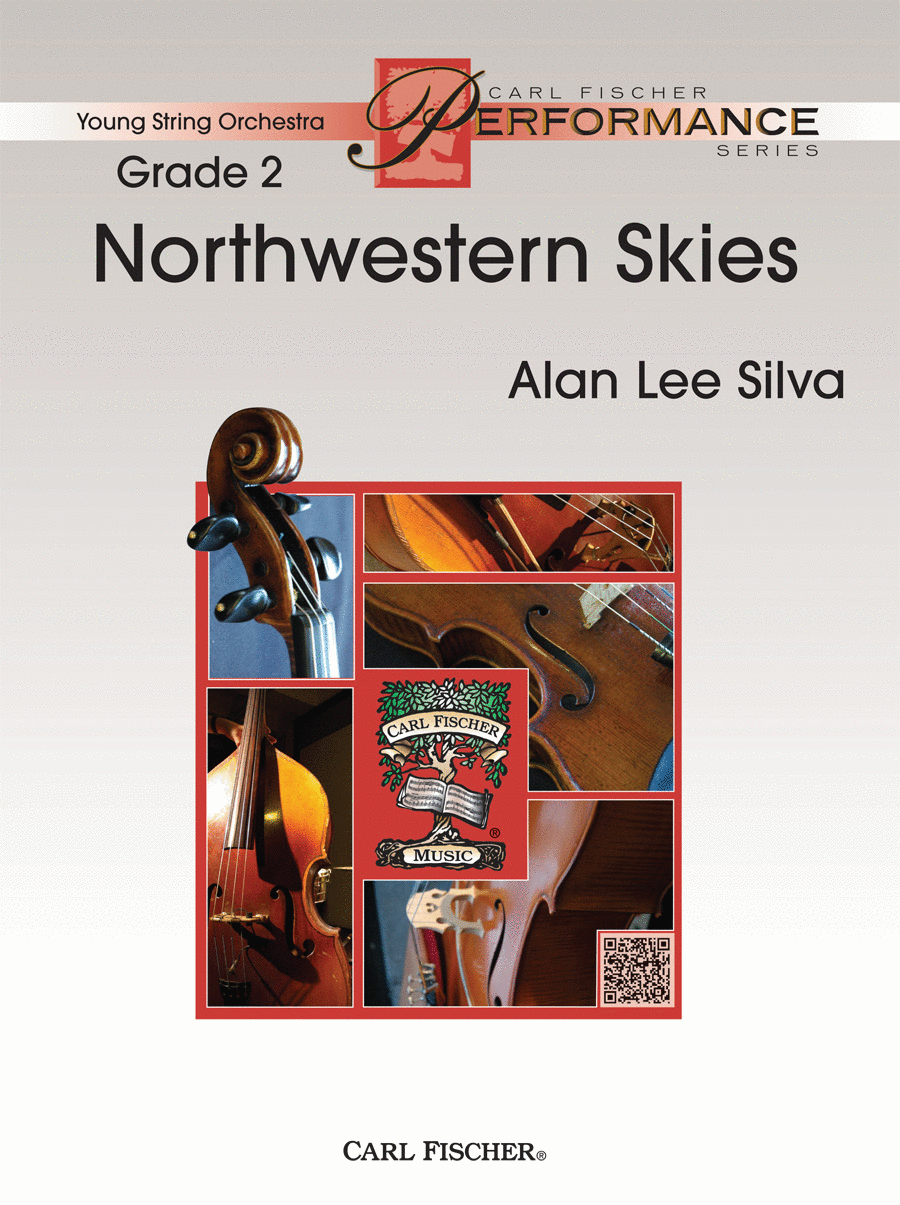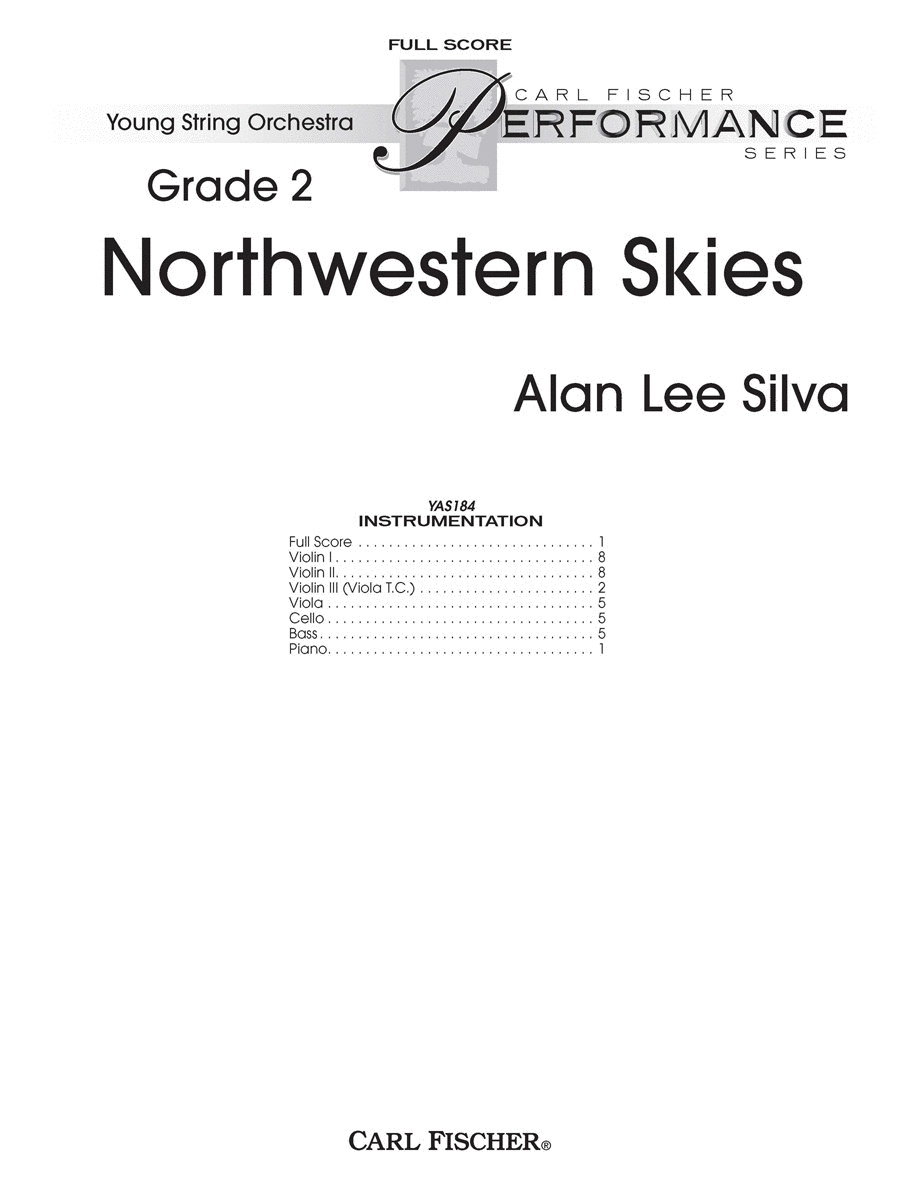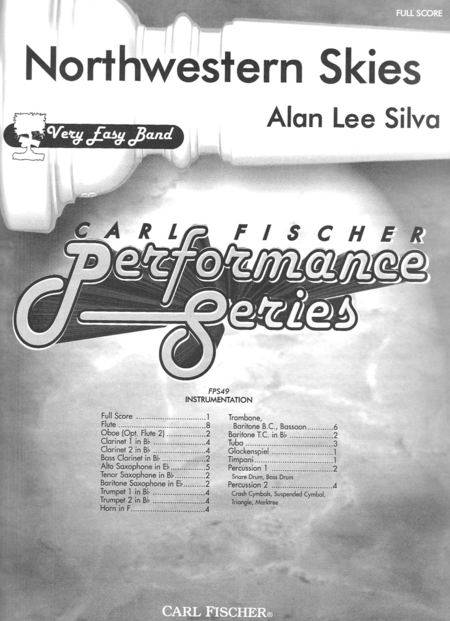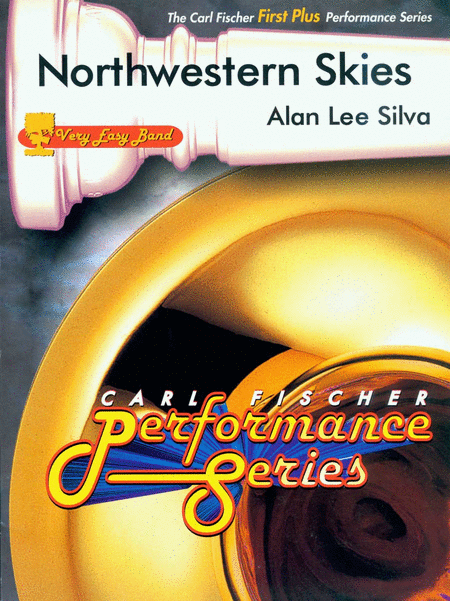Orchestra Cello, Contrabass, Piano, Viola, Violin 1, Violin 2, Violin 3 - Grade 2
SKU: CF.YAS184
Composed by Alan Lee Silva. Young String Orchestra (YAS). Set of Score and Parts. With Standard notation. 8+8+2+5+5+5+3+8 pages. Carl Fischer Music #YAS184. Published by Carl Fischer Music (CF.YAS184).
ISBN 9781491151495. UPC: 680160908998. 9 x 12 inches. Key: G major.
Alan Lee Silva's Northwestern Skies?is lyrical and fresh,? with his signature open and expressive style. Young string orchestras will sound rich and full with this sweeping composition.
From the opening fanfare to the final ensemble gesture, Northwestern Skies is an engaging musical journey with expressive ensemble phrases and challenging section features. The A theme at m. 9, a recurring heroic statement, provides an opportunity to develop solid tone production and intonation in sustained forte passages. The B theme at m. 17, enters quietly and features singing, legato lines and delicate accompaniment. The connected countermelodies in both the A and B sections should be balanced under the main melody. More instrtuments are added to the melody in m. 25, building to the return of the A theme in m. 33.
The lower strings carry the C theme in m. 49, supported by tutti figures in the upper strings. All sections come together in m. 56 to a ritardando into the Maestoso section, setting up a grand ensemble statement in m. 57-58. The moving legatolines at m. 59 and the aggressive figures at m. 61 propel the piece to its final build.
The Coda section at m. 65 begins with a variation of the B melody in the violas and then the violins over a dominant pedal point in the lower strings. Commanding tutti statements of the A theme at m. 69 end the piece with power and excitement.
.
From the opening fanfare to the final ensemble gesture, Northwestern Skies is an engaging musical journey with expressive ensemble phrases and challenging section features. The A theme at m. 9, a recurring heroic statement, provides an opportunity to develop solid tone production and intonation in sustained forte passages. The B theme at m. 17, enters quietly and features singing, legato lines and delicate accompaniment. The connected countermelodies in both the A and B sections should be balanced under the main melody. MoreA instrtuments areA added to the melody in m. 25, building to the return of the A theme in m. 33.
The lower stringsA carry the C theme in m. 49, supported byA tutti figures in the upper strings. All sections come together in m. 56 to a ritardando into the Maestoso section, setting up a grand ensemble statement in m. 57-58. The movingA legatolines at m. 59 and the aggressive figures at m. 61 propel the piece to its final build.
The Coda section at m. 65 begins with a variation of the B melody in theA violas and then the violinsA over a dominant pedal point in the lower strings. Commanding tutti statements of the A theme at m. 69 end the piece with power and excitement.
.
From the opening fanfare to the final ensemble gesture, Northwestern Skies is an engaging musical journey with expressive ensemble phrases and challenging section features. The A theme at m. 9, a recurring heroic statement, provides an opportunity to develop solid tone production and intonation in sustained forte passages. The B theme at m. 17, enters quietly and features singing, legato lines and delicate accompaniment. The connected countermelodies in both the A and B sections should be balanced under the main melody. MoreA instrtuments areA added to the melody in m. 25, building to the return of the A theme in m. 33.
The lower stringsA carry the C theme in m. 49, supported byA tutti figures in the upper strings. All sections come together in m. 56 to a ritardando into the Maestoso section, setting up a grand ensemble statement in m. 57-58. The movingA legatolines at m. 59 and the aggressive figures at m. 61 propel the piece to its final build.
The Coda section at m. 65 begins with a variation of the B melody in theA violas and then the violinsA over a dominant pedal point in the lower strings. Commanding tutti statements of the A theme at m. 69 end the piece with power and excitement.
.
From the opening fanfare to the final ensemble gesture, Northwestern Skies is an engaging musical journey with expressive ensemble phrases and challenging section features. The A theme at m. 9, a recurring heroic statement, provides an opportunity to develop solid tone production and intonation in sustained forte passages. The B theme at m. 17, enters quietly and features singing, legato lines and delicate accompaniment. The connected countermelodies in both the A and B sections should be balanced under the main melody. More instrtuments are added to the melody in m. 25, building to the return of the A theme in m. 33.
The lower strings carry the C theme in m. 49, supported by tutti figures in the upper strings. All sections come together in m. 56 to a ritardando into the Maestoso section, setting up a grand ensemble statement in m. 57-58. The moving legatolines at m. 59 and the aggressive figures at m. 61 propel the piece to its final build.
The Coda section at m. 65 begins with a variation of the B melody in the violas and then the violins over a dominant pedal point in the lower strings. Commanding tutti statements of the A theme at m. 69 end the piece with power and excitement.
.
From the opening fanfare to the final ensemble gesture, Northwestern Skies is an engaging musical journey with expressive ensemble phrases and challenging section features. The A theme at m. 9, a recurring heroic statement, provides an opportunity to develop solid tone production and intonation in sustained forte passages. The B theme at m. 17, enters quietly and features singing, legato lines and delicate accompaniment. The connected countermelodies in both the A and B sections should be balanced under the main melody. More instrtuments are added to the melody in m. 25, building to the return of the A theme in m. 33. The lower strings carry the C theme in m. 49, supported by tutti figures in the upper strings. All sections come together in m. 56 to a ritardando into the Maestoso section, setting up a grand ensemble statement in m. 57-58. The moving legatolines at m. 59 and the aggressive figures at m. 61 propel the piece to its final build. The Coda section at m. 65 begins with a variation of the B melody in the violas and then the violins over a dominant pedal point in the lower strings. Commanding tutti statements of the A theme at m. 69 end the piece with power and excitement.
 From the opening fanfare to the final ensemble gesture, Northwestern Skies is an engaging musical journey with expressive ensemble phrases and challenging section features. The A theme at m. 9, a recurring heroic statement, provides an opportunity to develop solid tone production and intonation in sustained forte passages. The B theme at m. 17, enters quietly and features singing, legato lines and delicate accompaniment. The connected countermelodies in both the A and B sections should be balanced under the main melody. More instrtuments are added to the melody in m. 25, building to the return of the A theme in m. 33.The lower strings carry the C theme in m. 49, supported by tutti figures in the upper strings. All sections come together in m. 56 to a ritardando into the Maestoso section, setting up a grand ensemble statement in m. 57-58. The moving legatolines at m. 59 and the aggressive figures at m. 61 propel the piece to its final build.The Coda section at m. 65 begins with a variation of the B melody in the violas and then the violins over a dominant pedal point in the lower strings. Commanding tutti statements of the A theme at m. 69 end the piece with power and excitement.
About Carl Fischer Young String Orchestra Series
This series of Grade 2/Grade 2.5 pieces is designed for second and third year ensembles. The pieces in this series are characterized by:
--Occasionally extending to third position
--Keys carefully considered for appropriate difficulty
--Addition of separate 2nd violin and viola parts
--Viola T.C. part included
--Increase in independence of parts over beginning levels
Publisher : Carl Fischer $55.00 - See more - Buy online
$55.00 - See more - Buy online
 (AMERICAN COMPANY)
(AMERICAN COMPANY) 




